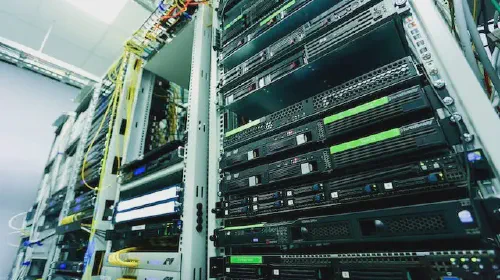VPN - A Vital Cybersecurity Tool | Protect Your Online Activity
Salomon Kisters
Jun 22, 2023This post may contain affiliate links. If you use these links to buy something we may earn a commission. Thanks!
In today’s world, cybersecurity has become more essential than ever before. With the increasing reliance on the internet, data breaches and cyber-attacks are becoming more common. VPN, or Virtual Private Network, is an essential tool to protect yourself online.
VPNs encrypt your online activity and provide you with a secure connection to the internet. By using a VPN, you can ensure your privacy and security while browsing the web. In this blog post, we will explore the importance of VPNs as a cybersecurity tool and how they work to protect your online activity.
Understanding VPN and Its Purpose
A VPN is a Virtual Private Network that creates a secure connection between your device and the internet. It achieves this by encrypting your online activity and routing it through a remote server. This means that your online activity cannot be intercepted, monitored or logged by anyone.
The primary purpose of a VPN is to provide you with privacy and security while browsing the internet. When you use a VPN, your IP address and location are hidden, giving you a certain level of anonymity. This helps to protect you from hackers, government surveillance, and other malicious entities that may be interested in your online activity.
VPNs are also useful for bypassing geographical restrictions and censorship. For example, if you’re traveling abroad and want to access content that’s only available in your home country, you can connect to a server in that country via your VPN and access the content as if you’re in that country.
Securing Data and Privacy with VPN
A VPN is an excellent tool that provides businesses and individuals with an added layer of security. By encrypting data that you transfer to and from your device, VPNs prevent hackers and cybercriminals from intercepting your information.
This way, even if your internet connection is compromised, your data will remain safe. VPNs also help protect online banking transactions, passwords, and sensitive documents from theft, protecting your privacy.
A VPN provides an additional advantage by preventing your internet service provider from monitoring your online activity. Without a VPN, your ISP can log your browsing history, searches, and downloads. By encrypting your connection, a VPN prevents the ISP from tracking your browsing activity, providing a higher level of privacy and security.
Moreover, VPNs can block unwanted ads and prevent websites from collecting your data for marketing purposes. This means that you can surf the web without worrying about being tracked by advertisers.
Unblocking Geo-Restricted Services with VPN
Another significant advantage of VPNs is that they help unblock geo-restricted services. Geo-restriction is a practice that content providers use to limit the availability of content based on a user’s location. For instance, if a streaming service like Netflix or Hulu is only available in certain countries, a user trying to access the service from a location outside these countries will be blocked.
However, with a VPN, you can easily circumvent these restrictions by connecting to a server located in a country where the service is available. This way, your IP address appears as though you are in that country, and you can access the content without any restriction.
This not only allows you to access content that would have been otherwise restricted, but it also helps you stay safe while doing so. By using a VPN to access geo-restricted content, you avoid using unsecured proxy servers or sites that could put your data at risk.
Protecting Your Devices from Cyber Threats with VPN
VPNs not only help you access restricted content but they also offer protection against cyber threats. When you connect to a public network (like the one at a coffee shop or airport), your device becomes vulnerable to attacks by hackers who can easily intercept your data. Using a VPN ensures that your data is encrypted, thereby preventing cybercriminals from accessing it.
Additionally, some VPNs use malware blockers and ad blockers to protect you from malicious software that could infect your device. Malicious software can cause severe damage to your device, compromise your personal data, and even steal your identity. By using a VPN with additional features like malware blockers and ad blockers, you can ensure that your device remains protected.
Choosing the Right VPN Service for Effective Cybersecurity
With so many VPN services available today, it can be overwhelming to choose the right one for your needs. When it comes to Cybersecurity, not all VPNs are created equal. Here are some factors to consider when choosing a VPN service for effective cybersecurity:
1. Security protocols
Choose a VPN provider that uses strong encryption protocols, such as OpenVPN, IKEv2 or L2TP/IPsec, to ensure that your data is encrypted and secure. Avoid VPN services that use outdated protocols like PPTP- these are no longer secure and can easily be breached by cybercriminals.
2. No-logs policy
A good VPN should have a strict no-logs policy, meaning that they do not keep any logs of your online activity. This ensures that your private data stays private, even if the VPN provider is forced to hand over the logs to government agencies.
3. Server location
Choose a VPN with servers in different countries and regions. This will allow you to access content that is geographically restricted from your location. It also ensures that you have a variety of servers to choose from and that your connection is not overcrowded- which can compromise security.
4. User-friendly interface
A good VPN should be easy to set up, configure and use. Choose a VPN provider with a user-friendly interface that is easy to navigate, and that allows you to connect to the VPN quickly and easily.
5. Customer support
In case you face any issues while using the VPN, it’s important to choose a VPN service that offers reliable and effective customer support. Look for VPNs with 24/7 customer service available through email, chat and phone support.
Conclusion
In today’s digitally-driven world, the use of a Virtual Private Network (VPN) is no longer an option but a necessity. With increasing cyber threats, VPNs provide a layer of security that ensures your online activities remain private and secure.
Most of us have become accustomed to connecting to public Wi-Fi networks, but these networks are not always secure and can be easily compromised by cybercriminals. A VPN encrypts your internet traffic, preventing hackers from intercepting your data and keeping your online activities safe from prying eyes.
Additionally, VPNs allow you to bypass geographically restricted content and access content that is not available in your region. If you’re traveling abroad, a VPN allows you to connect to servers in your home country, giving you access to content that might be blocked in the country you’re visiting.
Choosing the right VPN provider is essential for effective cybersecurity. By considering factors such as security protocols, a no-logs policy, server location, user-friendly interface, and customer support, you can select a VPN service that ensures your online activities remain private and secure.
In conclusion, a VPN has become an essential cybersecurity tool in today’s digitally-driven world. It provides a secure and private online experience that allows you to browse the internet with confidence. With the increasing cyber threats, it is imperative that individuals and organizations use VPNs to protect their online activities from being compromise
Stay informed with the latest insights in Crypto, Blockchain, and Cyber-Security! Subscribe to our newsletter now to receive exclusive updates, expert analyses, and current developments directly to your inbox. Don't miss the opportunity to expand your knowledge and stay up-to-date.
Love what you're reading? Subscribe for top stories in Crypto, Blockchain, and Cyber-Security. Stay informed with exclusive updates.
Please note that the Content may have been generated with the Help of AI. The editorial content of OriginStamp AG does not constitute a recommendation for investment or purchase advice. In principle, an investment can also lead to a total loss. Therefore, please seek advice before making an investment decision.

What is FileCoin and How Does it Work?
Let’s take a closer look at what Filecoin has done, and then take a look at the cryptocurrency itself.

What is a Soft Fork? [With Examples]
The process of changing a cryptocurrency blockchain is called forking. There are two kinds of forks: hard and soft. This article will cover the second type in detail with some examples.

Top 11 Blockchain Startups to Watch in 2023
Blockchain technology is gaining significant traction in the new digital economy. Here are 11 promising blockchain startups to watch in 2023.
Protect your documents
Your gateway to unforgeable data. Imprint the authenticity of your information with our blockchain timestamp